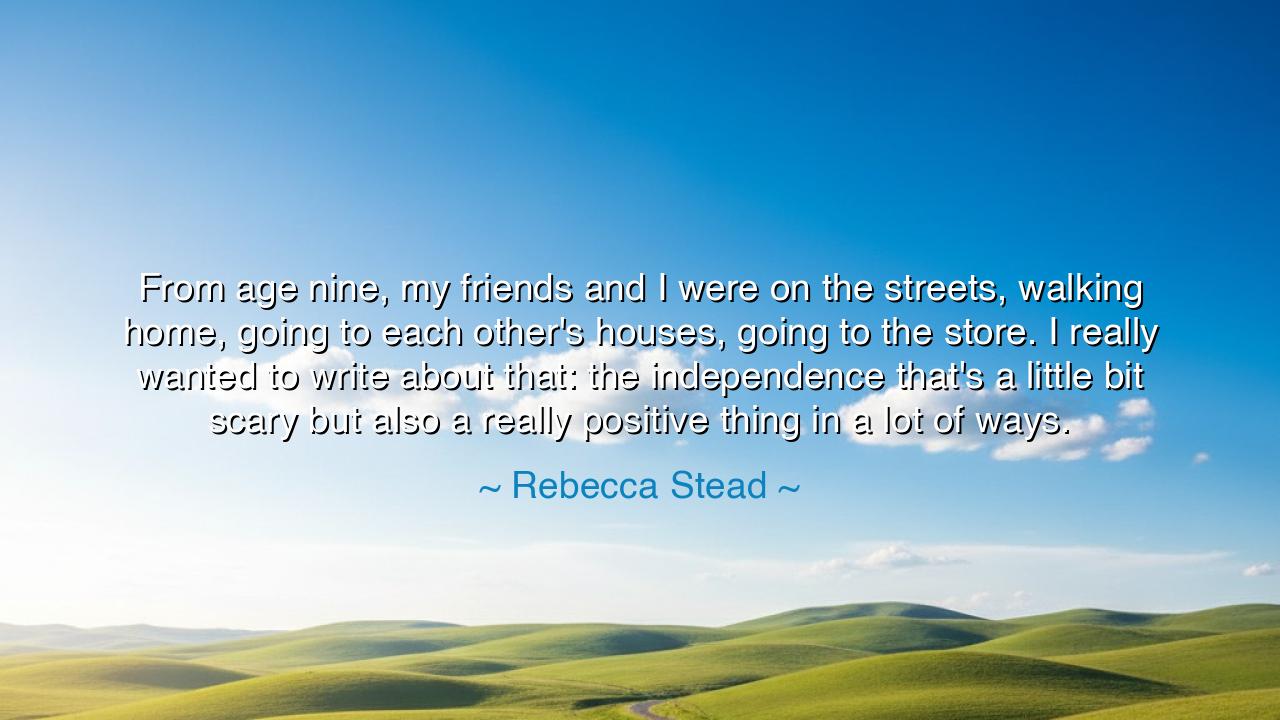
From age nine, my friends and I were on the streets, walking
From age nine, my friends and I were on the streets, walking home, going to each other's houses, going to the store. I really wanted to write about that: the independence that's a little bit scary but also a really positive thing in a lot of ways.






“From age nine, my friends and I were on the streets, walking home, going to each other’s houses, going to the store. I really wanted to write about that: the independence that’s a little bit scary, but also a really positive thing in a lot of ways.” Thus spoke Rebecca Stead, a teller of modern tales and chronicler of youth, whose words echo a truth as old as time — that the path to independence is paved not with certainty, but with courage. Her memory is not of rebellion, but of awakening — the first taste of selfhood, the trembling joy of freedom that arrives before the world grows heavy with fear. It is the song of a child stepping beyond the gate, feeling both small and infinite beneath the open sky.
In this simple recollection lies a profound wisdom: that independence is not born in triumph, but in the quiet, uncertain steps of growing souls. When Stead speaks of being nine, she calls forth an age of wonder — the time when a child first learns that the world is larger than home, and that to walk it alone is both thrilling and perilous. That mingling of fear and freedom is the crucible in which character is forged. It is where imagination meets responsibility, and innocence begins to transform into wisdom. The ancients, too, knew this journey well. They sent their children into the fields and forests not merely to labor, but to learn — to discover that strength grows only when tested, and that safety is sweetest when earned.
The scary independence Stead describes is the first encounter with destiny. It is the soul’s rehearsal for all that life will demand later — risk, choice, and trust. The child who walks to the store learns more than directions; they learn self-reliance. The child who explores the neighborhood learns not only geography, but courage. For every small act of freedom teaches the greater lesson: that to live is to venture, and to love is to let go. The fear in these moments is not an enemy, but a guide — the guardian of growth that whispers, “Be careful, but continue.” Without that fear, courage would have no meaning.
Consider the story of Telemachus, the son of Odysseus, from the Odyssey. When his father did not return from war, Telemachus had to leave his home in search of him — a journey both terrifying and necessary. He was but a youth, uncertain and untested, yet by stepping beyond the safety of Ithaca, he became a man. His independence did not come through ease or comfort, but through the boldness to face a world that neither waited for him nor promised kindness. Like Stead’s childhood wanderings, his was a passage from dependency to selfhood — a testament that all great growth begins with the first uncertain step into the unknown.
In the modern world, children are often guarded too closely, cocooned from the very experiences that once shaped resilience. The streets where Stead and her friends walked have become symbols of danger rather than discovery. Yet her words remind us that freedom, though it carries risk, is also the foundation of confidence. A life lived in perfect safety is a life untested, and therefore unfulfilled. The ancients would have called such overprotection a theft — the theft of the spirit’s chance to prove itself. For one must stumble a little to learn balance, must wander a little to learn direction.
The positivity Stead speaks of lies in this very tension — that independence is both a challenge and a blessing. It teaches responsibility, empathy, and courage in ways no instruction ever could. When a child learns to navigate the world, they also learn to trust themselves — to see that they can act, decide, and endure. Such lessons shape the foundation of adulthood. For how can a person lead, create, or love deeply if they have never first stood alone and faced their own small fears? The world becomes less frightening only when one learns to walk through it.
So let this truth be passed down to those who follow: do not fear to give your children, or yourself, the gift of independence. Allow them to explore, to fail, to find their way home with dust on their shoes and wonder in their eyes. Protect them, but not so tightly that they forget how to be brave. For life’s truest strength is not born in comfort, but in the mingling of fear and freedom, of trembling steps and steady hearts.
And remember — every great soul begins as a child who dared to walk a little further from home. The streets may seem long, the world vast, but beyond the gate lies the beginning of wisdom. Let us, then, celebrate that sacred moment when the child within us — or beside us — takes that first uncertain stride toward their own becoming, and in doing so, learns what it truly means to be free.






AAdministratorAdministrator
Welcome, honored guests. Please leave a comment, we will respond soon